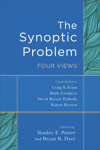
Overview
Leading Scholars Debate a Key New Testament Topic
The relationship between Matthew, Mark, and Luke is one of the most contested topics in Gospel studies. How do we account for the close similarities--and differences--in the Synoptic Gospels? In the last few decades, the standard answers to the typical questions regarding the Synoptic Problem have come under fire, while new approaches have surfaced. This up-to-date introduction articulates and debates the four major views. Following an overview of the issues, leading proponents of each view set forth their positions and respond to each of the other views. A concluding chapter summarizes the discussion and charts a direction for further study.
The relationship between Matthew, Mark, and Luke is one of the most contested topics in Gospel studies. How do we account for the close similarities--and differences--in the Synoptic Gospels? In the last few decades, the standard answers to the typical questions regarding the Synoptic Problem have come under fire, while new approaches have surfaced. This up-to-date introduction articulates and debates the four major views. Following an overview of the issues, leading proponents of each view set forth their positions and respond to each of the other views. A concluding chapter summarizes the discussion and charts a direction for further study.
Table of Contents
Contents
1. The Synoptic Problem: An Introduction to Its Key Terms, Concepts, Figures, and Hypotheses
Stanley E. Porter and Bryan R. Dyer
2. The Two Source Hypothesis
Craig A. Evans
3. The Farrer Hypothesis
Mark Goodacre
4. The Two Gospel Hypothesis
David Barrett Peabody
5. The Orality and Memory Hypothesis
Rainer Riesner
6. Two Source Hypothesis Response
Craig A. Evans
7. Farrer Hypothesis Response
Mark Goodacre
8. Two Gospel Hypothesis Response
David Barrett Peabody
9. Orality and Memory Hypothesis Response
Rainer Riesner
10. What Have We Learned regarding the Synoptic Problem, and What Do We Still Need to Learn?
Stanley E. Porter and Bryan R. Dyer
Indexes
1. The Synoptic Problem: An Introduction to Its Key Terms, Concepts, Figures, and Hypotheses
Stanley E. Porter and Bryan R. Dyer
2. The Two Source Hypothesis
Craig A. Evans
3. The Farrer Hypothesis
Mark Goodacre
4. The Two Gospel Hypothesis
David Barrett Peabody
5. The Orality and Memory Hypothesis
Rainer Riesner
6. Two Source Hypothesis Response
Craig A. Evans
7. Farrer Hypothesis Response
Mark Goodacre
8. Two Gospel Hypothesis Response
David Barrett Peabody
9. Orality and Memory Hypothesis Response
Rainer Riesner
10. What Have We Learned regarding the Synoptic Problem, and What Do We Still Need to Learn?
Stanley E. Porter and Bryan R. Dyer
Indexes
Endorsements
"Multiple-views books on controversial biblical and theological topics have become quite popular and helpful, especially when each contributor responds to the others. This volume is particularly well done, and Porter and Dyer have enlisted outstanding representatives of each of the four most viable solutions to the Synoptic Problem. Most welcome is Riesner's emphasis on the role of oral tradition and memory in the formation of the Gospel tradition, as well as the gracious tone of all the contributors. The editors place each theory into the history of the discussion, so that students can consider this 'one-stop shopping' for scholarship on this important topic."
Craig L. Blomberg, Distinguished Professor of New Testament, Denver Seminary
"For any who think that the Synoptic Problem has been solved or that its debate has stalled out, this book suggests that there is a more vibrant conversation to be engaged. Porter and Dyer have assembled a stellar team for the exchange. I can't imagine a better lineup than Evans, Goodacre, Peabody, and Riesner as spokespersons for their respective views. The Synoptic Problem is wonderfully accessible, is an ideal point of entry for those new to the topic, and offers fresh perspective on this important and perennial issue."
Jeannine K. Brown, professor of New Testament, Bethel Seminary San Diego
"Few New Testament issues have garnered more reflection and debate over the last four centuries than the Synoptic Problem. We have long needed a fresh perspective that can make us see the situation more clearly and move the discussion to a new level. This volume provides that perspective. It sums up the state of the issue and provides a way forward for the future. I highly recommend it to all readers."
Grant R. Osborne, New Testament professor emeritus, Trinity Evangelical Divinity School
"A must-read for anyone interested in understanding the Synoptic Problem! The four main views (the Two Source Hypothesis, the Farrer Hypothesis, the Two Gospel Hypothesis, and the Orality and Memory Hypothesis) are ably presented by their supporters and then critiqued by their opponents. The critiques are an excellent example of how different views can be held and debated among scholars."
Robert H. Stein, senior professor of New Testament interpretation, Southern Baptist Theological Seminary